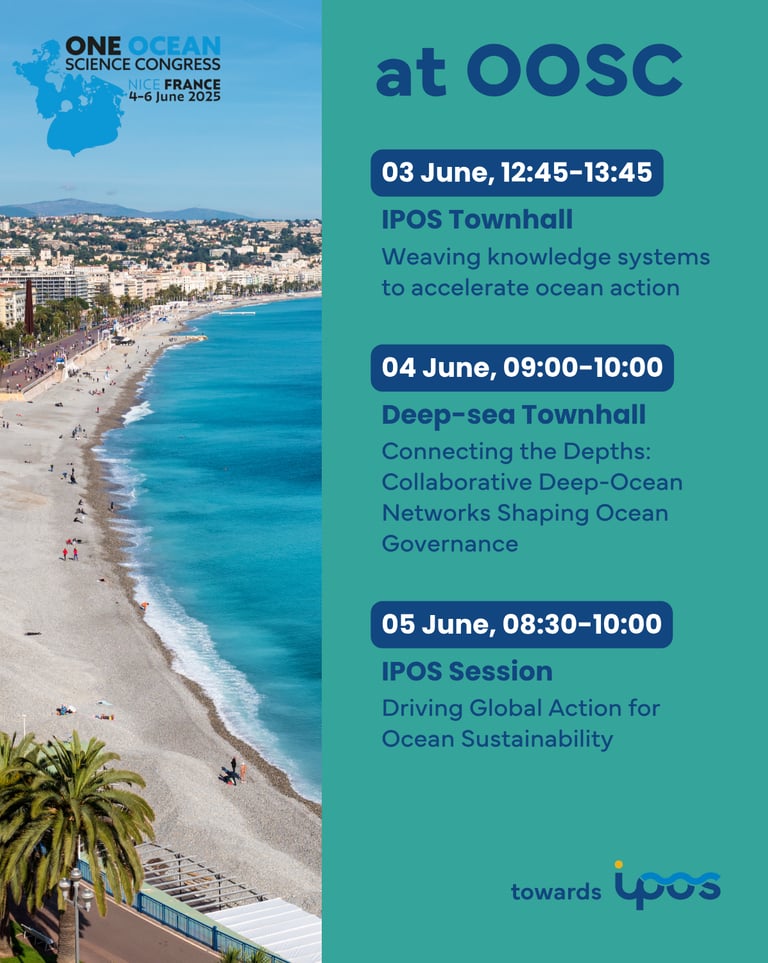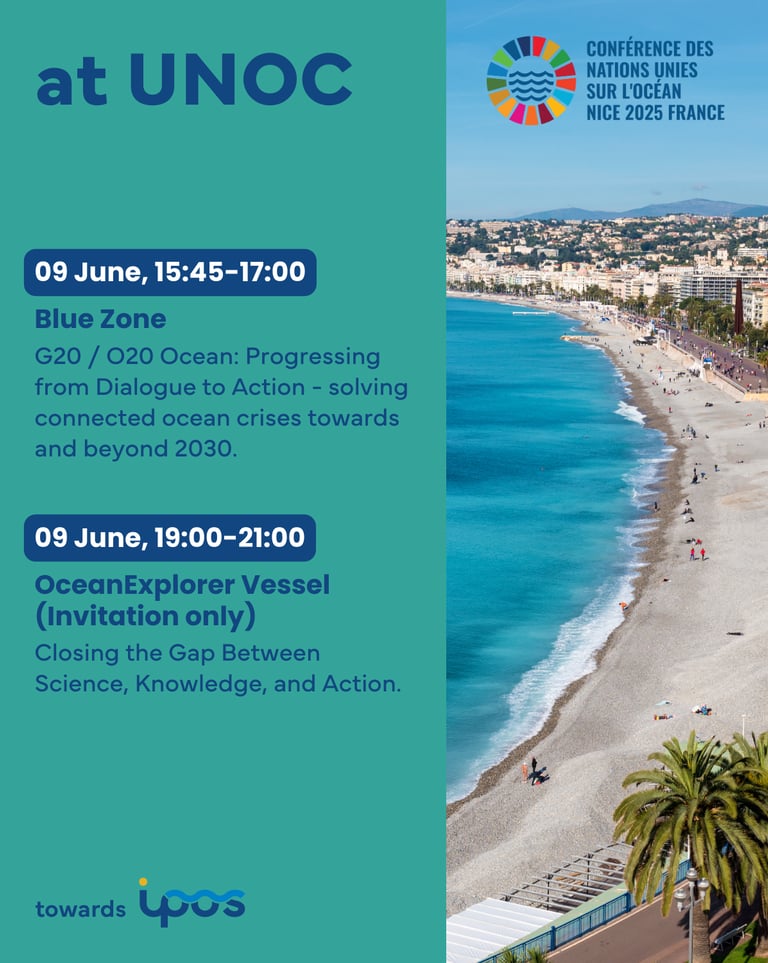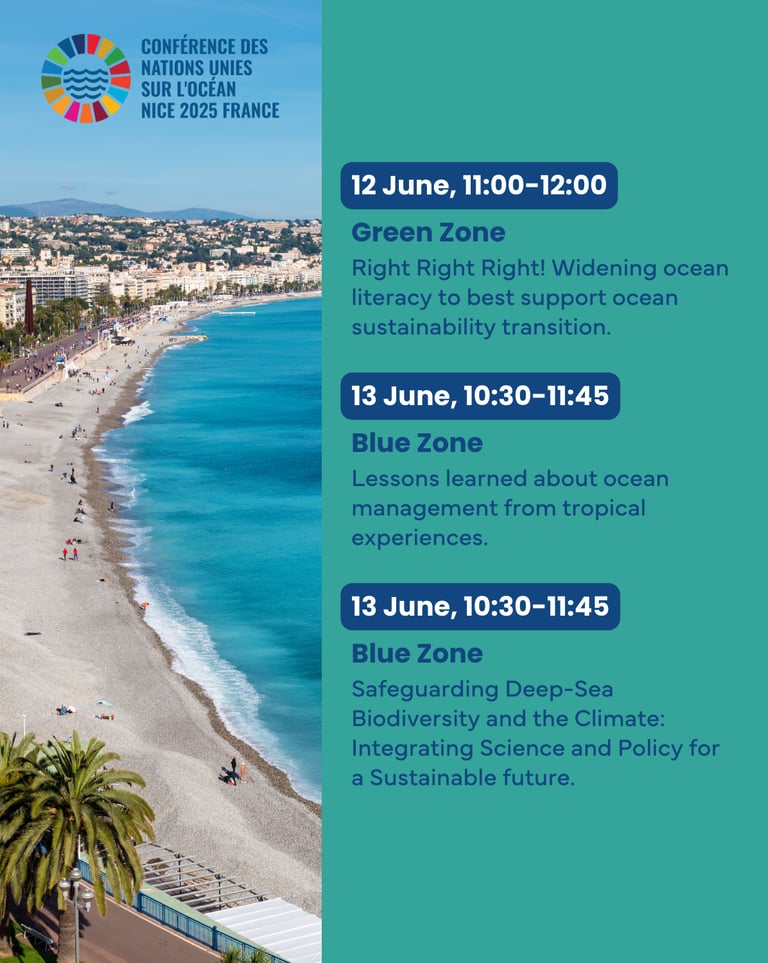IPOS at OOSC and UNOC
IPOS Launches Ramp Up Phase with Open Call to States at UN Ocean Conference
The International Platform for Ocean Sustainability (IPOS) officially launched the ramp up phase of its operations at a high-level event aboard the OceanXplorer vessel, during the 2025 UN Ocean Conference (UNOC-3) in Nice.
The launch follows the formal recognition of IPOS in the final draft of the UNOC Declaration, which cites the Platform as a key initiative to help address growing demands for credible, timely, and inclusive knowledge to support ocean sustainability. IPOS is now opening a call to States to submit requests for knowledge support during its two-year ramp up period.
“We are honoured to see IPOS included in the UN Ocean Conference Declaration, as well as the European Union’s Ocean Pact. This moment marks the beginning of a new chapter in ocean governance – one where evidence, equity, and innovation come together to support smarter, more inclusive decisions for our Ocean.” - Tanya Brodie Rudolph, IPOS Co-Lead
A New Kind of Science-Policy Interface
IPOS is designed as a next-generation ocean knowledge-action interface – one that is fast, responsive, and capable of co-producing knowledge that is actionable, inclusive, and scientifically rigorous. By combining frontier science, Indigenous and local knowledge, and AI-enabled synthesis, IPOS offers a unique platform to support governments and communities navigating complex sustainability decisions.
Backed by growing international support – including from the European Commission, France, China, Chile, Monaco, Seychelles, Costa Rica, Panama, Belgium and a coalition of over 50 scientific institutions – IPOS is a groundbreaking demand-driven, global mechanism connecting ocean science, policy, and society. IPOS is not just about creating more information – it’s about providing action-oriented policy insights that are based on credible science and diverse knowledge streams to inform decisions. At its core are three transformative services:
Action Requests – States can request detailed policy options based on the best available knowledge, delivered within 12 months. These requests will be answered by composite working groups, including scientists, local and Indigenous knowledge holders, civil society, and private sector representatives. The group will regularly liaise with the requesting government staff.
Rapid Responses – Urgent knowledge needs will be met within weeks by experts, supported by an AI-powered system that synthesizes curated literature. Responses will be peer-reviewed by external experts and follow ethical AI use guidelines.
Ocean Catalyst – A collaborative forum for governments, experts, civil society, and private sector to discuss challenges, solutions, and best practices for Ocean sustainability. Insights from these discussions will be shared in global and regional reports.
"IPOS is not just about providing information, it’s about listening, connecting communities, and building trust between those who hold knowledge and those making decisions. It’s a deeply human-centred process.” - Vivienne Solís, Director of CoopeSoliDar, Costa Rica
During the test phase, IPOS will respond to 10 requests from States, prioritised by criteria such as environmental impact, urgency, feasibility, stakeholder support, socioeconomic benefits, and the availability of technical support. A weighted scoring system development index, reflecting IPOS’s commitment to equity and shared stewardship.
Selected requests will reflect a careful balance across: (i) diverse geographic regions, (ii) a mix of development contexts, and (iii) a wide spectrum of themes under the Sustainable Development Goals (SDGs), the Kunming-Montreal Global Biodiversity Framework (GBF), and the Biodiversity Beyond National Jurisdiction (BBNJ) Agreement.
All UN Member States are encouraged to apply, with a special emphasis on engaging the Global South to ensure IPOS delivers meaningful, context-responsive solutions to a wide variety of policy and knowledge systems.
A Collaborative, Human-Centred Approach
The launch event was held aboard the OceanXplorer, hosted in partnership with the Dalio Foundation’s OceanX initiative. Opening remarks were delivered by Vincent Pieribone, followed by a keynote from Philippe Baptiste, French Minister for Higher Education and Research, and from Juan Carlos Navarro, Minister of the Environment of Panama.
“In a rapidly changing ocean, the window for effective action is narrowing. IPOS is here to make sure the best science – cutting-edge and co-created – is reaching the people who need it, when they need it.” - Vincent Pieribone, co-CEO of OceanX
A screening of the short film “Anthem for the Ocean”, featuring Yo-Yo Ma and Zolani Mahola, and produced by the Sea Change Project, was also premiered at the event. The evening concluded with remarks by Vidar Helgesen, Executive Secretary of UNESCO's Intergovernmental Oceanographic Commission.
Call to Action
IPOS now invites States to submit requests via its online portal, which opened today, 9 June 2025. Requests will be reviewed by a global panel of experts, with the first projects commencing in the third quarter of this year. The deadline to apply is 31 August 2025.
Groundbreaking global initiative offers next-generation science-policy interface for Ocean sustainability







